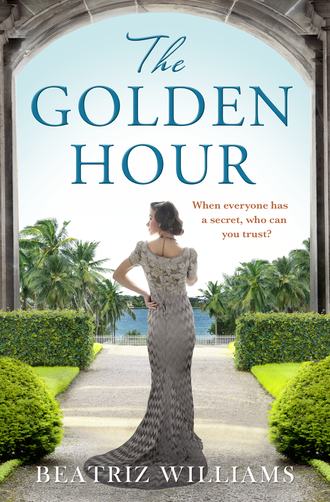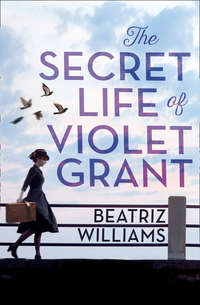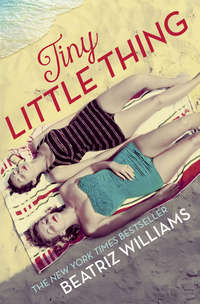
Полная версия
The Golden Hour
I have an idea, Wilfred said. Let’s not speak of that day until it comes.
NOW IT’S COME.
“What?” Elfriede says.
“After all, I’ve regained my health.”
“But they don’t ever make you leave, the doctors. You can stay as long as you like.”
“Only if you’ve got the dosh, my dear.”
“But I could—we could—I have plenty of money—”
“You mean your husband has plenty of money.”
Elfriede bows her head to this truth. Across the meadow, about thirty yards away, the grass stirs. A rodent of some kind, or a rabbit. Making preparation for winter, though the sun is still warm, no hint of evil yet cools the air.
“We have until Thursday,” Wilfred says. “Four more days.”
“And then what?”
“Nothing. I go about my life, pretending my heart’s not beating away somewhere else, beating inside your chest—”
“Oh, don’t. Don’t.”
He doesn’t. So they sit, as they always do, as they’ve done for the past few weeks, since Wilfred was first allowed out of the infirmary garden with strict instructions not to exert himself, not to expose his lungs to any hint of inclement weather. Lucky for them, the weather has been fine, an unprecedented succession of warm, dry, perfect days. Or maybe it’s not luck, after all. Maybe some more conscious force has arranged their affairs in this manner. Either way, the result’s the same. They sit side by side in the meadow grass, watching the sun make its eternal arc across the heavens. Sometimes he touches her, as he does now. His fingertips on the backs of her knuckles.
“I once met this fellow in the south of France, this painter. Do you know what he called this time of day? The hour before sunset?”
“No.”
“The golden hour.” Wilfred waves his hand at the sun, which now burns just above the jagged peaks that form their horizon. “He said that’s when everything looks the most beautiful, just before the sun sets. This luminous air turning everything to gold. He said it made him want to paint the whole world. And then it’s gone, just like that. The sun disappears. The night arrives.”
“The golden hour.” Elfriede stares at Wilfred’s hair, which has indeed transformed into a gold so pure as to make the alchemists weep, like the sun itself. She wants to touch it, to bury her face in it, to lick the gold from each strand before it’s gone. Before Wilfred’s gone, and the night arrives.
“What about you, Elfriede?” he asks. “That’s the important thing. What will you do?”
“I don’t know. Except I can’t stay here any longer if you’re gone.”
“Can’t you?”
“No, it’s impossible. It will hurt too much.”
“Not so much as it hurts me to leave.”
“No, more. Because you’ll have Vienna, you’ll have new sights and scenes, nothing to remind you of me. Whereas here, these buildings, this mountain, this meadow—everything is you now. And it will be empty.”
“Is that so intolerable?”
“You know it is.”
“Hmm.” The fingertips make another waltz on her knuckles. A Blue Danube of longing. “I thought you needed approval from this doctor to leave. Are you certain you want to cross him?”
“He can’t stop me. I’ll find a way out, like you.”
Find a way out. Once she says the words, once she releases them into the air, they become possible. The horror of the outside world loses all consequence compared to the horror of existing inside the sanatorium without Wilfred. Against that, she has no other fear: not the mountain roads or the trains or the stares of strangers, not the husband she has disappointed, not the baby who doesn’t know her, not Herr Doktor Hermann and all his degrees and authority. She can leave. She is the wife of a baron, after all. She can arrange for a carriage, she can simply walk out the door if she wants. Who will dare to stop her?
Elfriede straightens her back. Her eyes are dry now, her blood’s warm. “Yes. I can’t stay here without you. I’ll leave.”
“Good,” says Wilfred. “That’s settled. But where will you go, my heart?”
She curls her fingers inside her palm, so that her entire hand disappears in the grass beneath Wilfred’s hand. Sometimes, sitting in this patch of meadow under the sun, smelling the warm, dead flowers, she forgets that anything else exists except the two of them, disappearing into the grass and each other.
Where will she go? She belongs to only one other place. Only one other heart beats inside her chest, whether she wants it there or not.
“Back to my son, maybe,” she says. “Maybe I’ll go back to my son and miss your freckles. All twenty-six of them.”
BUT NO SUCH AGONIZING DECISION needs to be made, after all. When Elfriede returns to the sanatorium—by a different path from Wilfred’s, of course—Herr Doktor Hermann waits for her in her room. He takes her hands.
“There is terrible news, Elfriede,” he tells her. “I’m afraid your husband is very sick. The family has summoned you home to his side.”
LULU
JULY 1941
(The Bahamas)
BY THE TIME the evening wound to its end, I’d lost track of all the names, all the faces. They passed in a blur while the duchess guided me around the garden, under the lanterns, introducing me like a prize filly, and I pranced and pawed and whinnied on cue, made almost dizzy by this extraordinary ascent of fortune. In the months to come, I didn’t remember the exact moment in which I first met Mrs. Gudewill and her daughters, or Fred Sigrist, or the other men and women who were to figure so prominently in this Bahamian chapter of my life. I didn’t remember the precise drip of information that fed its way through my ears and into my brain, to be picked through and examined later. I do remember that I stood once more in the duke’s study, speaking to Axel Wenner-Gren—yes, him, the Swedish industrialist, owner of Hog Island, the sort of fellow attracted to tax havens like the Bahamas like ants to picnics—when Thorpe reappeared. By now, most of the guests had left, and only a few of us remained to drink bourbon whiskey from the Windsor cabinet and listen to the duke’s collection of popular American songs on the phonograph. Mr. Wenner-Gren wanted to know more about my husband.
“How long were you married?” he asked.
“Only a year.”
“Then you were newlyweds. What a terrible thing, this war.”
“What’s the war got to do with it?”
“Oh, I beg your pardon. I assumed he was killed in battle.”
I tried to speak and realized the muscles of my throat were paralyzed, that my pulse struck like a hammer in my neck. The familiar panic. You never knew when it might seize you, when it might sock your gut at any sudden noise, any bang of a window, any innocent question. When it struck, you had to remember to breathe in through your nose and out through your mouth, to disguise your terror as something else, like grief. When the panic receded, when the muscles softened enough to enable you to speak at all, you spoke haltingly, as if mastering your anguish, so that no one would suspect you were lying.
“No,” I said. “He was killed in an accident. A terrible accident.”
Now, though he was all of sixty years old, this Wenner-Gren was still an attractive man, a man of silver hair and elegant movements and perceptive blue eyes of the X-ray variety, if you know what I mean. He smoked his cigarette and stared at me, not at all moved by my widowhood, while I resisted the urge to cross my arms over my chest and ask him if the rumors were true, that he was really a Nazi, that he was friends with Goering and that his real mission here in Nassau was to persuade the duke to cast his fortunes with a triumphant Germany. After all, wasn’t that exactly the kind of worldwide exclusive the Metropolitan had sent me to the Bahamas to discover? Wasn’t Axel Wenner-Gren exactly the kind of man with whom I’d been desperate to sidle myself into profitable intimacy?
He leaned his face toward mine. “This must be terribly lonely for you.”
“Oh, I keep myself busy. Not as busy as you do, of course, with your yacht and your lovely estate.”
“Ah. What do you know about my estate?”
“Isn’t it right there on Hog Island? I can just about see it from my bedroom window.”
“Can you, now?”
“And your yacht, of course. There’s no mistaking her.” I paused to sip my drink. “Where are you headed next? I hear you’re much enamored of Mexico these days. You’ve started a bank there, haven’t you? The Banco Continental.”
His eyebrows rose. He turned his face politely away to blow out a stream of smoke, and while he did so, breaking gaze for just that instant, his eyes flicked downward to appraise the sharp, deep neckline of my dress. “You seem to hear a great many things, Mrs. Randolph.”
“Oh, one keeps one’s ears open. And Nassau is terrible for gossip. It’s the favorite pastime. Everybody seems to be knee-deep in each other’s dirty business.”
“So my wife tells me. And what else have you heard about me?”
“Oh, this and that.” I shrugged. “I can’t remember most of it. But tell me more about Mexico. I’ve always wanted to go.”
He took a long, slow drag from his cigarette, examined the diminished end, and said softly, “Perhaps you might join us on our next voyage. We intend to make an archaeological expedition to South America, and then travel up to Mexico in time for Christmas.”
“How kind of you. When do you cast off?”
Wenner-Gren opened his mouth, but it wasn’t his voice that answered me.
“Any day now, isn’t that right? I’d go myself, if I wasn’t already occupied.”
The words came from somewhere near my right shoulder, causing us both to startle and turn to the doorway, where Mr. Thorpe stood in his white dinner jacket, long and wide-shouldered and lean as a wooden cross. His head was bare and the spectacles perched at the very end of his nose. He pushed them up and smiled.
“My dear Thorpe,” said Wenner-Gren. “I thought you had disappeared, as usual.”
“Merely counting my profits in the back office.”
“Don’t tell me you’ve finished raiding all the pockets already,” I said.
“Every shilling accounted for.” Thorpe held out his elbow. “Might I have a private word with you, Mrs. Randolph?”
I suppose I gaped. He hadn’t shown the slightest sign of recognition earlier, and though I’d caught glimpse after glimpse of him during the course of the party, we had never come face to face, as if some contract had been drawn up between us, some agreement not to acknowledge each other. I thought he had probably forgotten me, forgotten the episode on the airplane, or at least my face in the middle of it. And now he held out his elbow to me.
“Thorpe, old chap,” said Wenner-Gren, in the funny way that men of all nations will ape certain expressions of the English upper classes. “I didn’t know you were a friend of Mrs. Randolph’s.”
“We met on an airplane,” said Thorpe, pronouncing the word in three syllables, air-o-plane, “and formed an instant connection. Didn’t we, Mrs. Randolph?”
His face was grave, his fair skin pink beneath the freckles. I considered his eyes, which were blue and slightly hooded behind his spectacles, giving you an impression of great depth. I glanced back at Wenner-Gren’s face and discovered a cool, pale stare like a reptile’s.
I set down my half-finished bourbon on the edge of the Duke of Windsor’s desk. “That’s a wonderful question, Mr. Thorpe. I guess we might as well find out.”
WE DIDN’T SAY A WORD until we reached the center of the main hallway, right between the staircase and the front entrance, where the panic hit my stomach once more. I snatched my hand from Thorpe’s elbow. “Thanks very much for rescuing me in there. I won’t trouble you further.”
“Now, wait just a moment, Mrs.—”
But I was already pushing open the door, already hurrying across the portico. He caught up with me a few steps later and touched my elbow. I stopped and whirled to face him.
“Did I say I wanted company, Mr. Thorpe?”
“Look here. You can’t just fly off alone like that.”
“You can’t possibly think I’d go off with you.”
“Why not?”
“Why not? I don’t even know you. For all I know, you’re a homicidal maniac. Or worse.”
“Worse? What could be worse than that?”
I lifted my chin and fixed him with a certain stare of mine. He gave my displeasure his full attention, while some bird trilled out a mighty evening song from the portico above. It takes a certain amount of strength, you know, to gaze without blinking into the eyes of a man you hardly know, a man as tall and dazzling as Thorpe, and to this day I don’t quite understand how I held firm, or why. From the windows of Government House floated the mist of some jiggly, dancing tune I didn’t recognize, the shadow of somebody’s braying laugh. The dark air lay against Thorpe’s skin. His eyes were narrowed and gray, the way the night drains color from everything. At last he sighed, glanced heavenward, and made a half turn toward the Government House entrance. “Taylor!” he called out.
For the first time, I noticed the footman there, or rather the doorman, straight-shouldered and tidy in his white uniform against the pink facade, lit by the windows behind him. “Yes, sir?” he said, staring straight ahead.
“You’ve seen me leave the premises in the company of Mrs. Randolph, correct?”
“Indeed, sir.”
“If something untoward occurs, you’re prepared to swear to that effect in a court of law?”
“Without hesitation, sir.”
Thorpe turned back to me. “You see? Nothing to fear. Intentions entirely honorable.”
I resumed walking toward the stairs. The air had cooled no more than a few degrees with the coming of night, but at least the brutal sun had sunk away. The atmosphere was hazy, the stars blurred in the sky above the nearby ocean. I didn’t need to look over my shoulder; I knew Thorpe had joined me. “That doesn’t prove a thing,” I said. “For all I know, you’re in collusion.”
“You’re a damned suspicious woman, Mrs. Randolph.”
“Women need to be suspicious, Thorpe, suspicious of everyone and everything. A woman on her own, especially. It’s a matter of survival.”
“Not all men are beasts, you know.”
“Enough of them are. Even one’s enough. Once you encounter your first wolf, why, you start to notice them everywhere.”
“I see,” he said. “Are we speaking of Mr. Randolph, perhaps?”
We were tripping down the endless flight of stairs, had already passed the statue of Columbus. Below us, the street was dark and quiet. I stopped midstep and waited for Thorpe to halt, to turn, two stairs below, so that his face sat at last on the same level as mine.
“There was a girl back at college,” I said. “Went off with a boy after a party, just like a little lamb. It didn’t end well.”
“I see.”
“No, you don’t. You don’t have the smallest idea. You’ve never been anybody’s prey.”
“Not true.”
I lifted my eyebrows and stared at his large, earnest face, his eyes behind the spectacles. I thought he was going to say more, tell me some story, even if it wasn’t real. But the lips didn’t move. Just those two words, Not true, a pair of words that covered a vast territory.
“All right,” I said. “But I’ll bet you were evenly matched, weren’t you? A big cat like you. You could fight back.”
“Fair point. But I might say the same of you.”
“Me?”
“You might not be so big, of course. But you seem to me like the sort of woman who fights back.”
The streetlamps cast a soft yellow heat on his face. He stood with one foot braced on the step above; his hand rested on his thigh. I was conscious of my daring neckline, my exposed skin, my scarcity of sleeves, my breath trapped in my lungs, my thundering heart. The goose bumps prickling my arms, which could not possibly have sprung from the tropical air.
“That man on the airplane,” I said. “What did you do to him?”
“Nothing at all.”
“No, that was something, all right. Something I wouldn’t mind learning how to do, should another wolf come bounding into my life, for example.”
Thorpe rubbed his fist on his knee and looked to the side, at an upward angle, as if considering the sky above the ocean. His nose was robust, almost Roman, and yet there was something vulnerable about his profile or else the way he presented it to me. “By college,” he said, “do you mean you were at university?”
“Yes.”
“And this girl. She was a friend of yours?”
I stared at his cheekbone. “We were inseparable.”
“I see.” He turned back to me. “I found myself at the bar at the Prince George a week or two ago. Happened to catch a glimpse of a girl sitting all by herself. She was drinking a Scotch whiskey, I believe, no ice, reading a book, and her hair kept falling over her forehead, and she kept pushing it back. Eventually she looked up and glanced my way—I imagine she must have sensed me watching—and I recognized her at once. The girl from the airplane.”
I held out my hand. “Leonora Randolph. But you can call me Lulu.”
“Lulu. I’m Benedict.”
“Benedict?”
“I was named after my father. His middle name.”
“I can’t call you Benedict.”
He shrugged. “Then call me whatever you want.”
HE WALKED ME DOWN GEORGE Street to the hotel. We didn’t touch, nor did we speak until we turned the corner of Bay Street and stopped. Thorpe stuck his hands in his pockets and looked toward the harbor. “Still the Prince George?” he said.
“Still the Prince George.”
“Sounds rather temporary.”
“I might be looking for something a little more permanent.”
He turned his head. “Really?”
“Seems I’m about to enter paid employment. If all goes well.”
“Congratulations. Splendid news.”
“You don’t seem surprised.”
“I might have made a few inquiries regarding your intentions here,” he said.
I snapped my fingers. “Jack! That old so-and-so. I might’ve known.”
“I’m afraid I can’t reveal my sources.”
“There’s no need. I can practically smell him on you. Say …”
Thorpe lifted an eyebrow and stared at me patiently. Behind him, the street was empty, except for the British Colonial rising brilliantly against the sky. The air smelled stickily of night blossom, of the nearby ocean, of the lingering afternoon ether of automobile exhaust. There’s a particular odor to a Nassau evening, a perfume I’ve never encountered since. I wrapped my hands around my pocketbook and said, “I’ll bet that was you, wasn’t it? That drink the other night.”
“I haven’t the least idea what you’re talking about.”
“Jack said you were a shy kind of fellow.”
Конец ознакомительного фрагмента.
Текст предоставлен ООО «ЛитРес».
Прочитайте эту книгу целиком, купив полную легальную версию на ЛитРес.
Безопасно оплатить книгу можно банковской картой Visa, MasterCard, Maestro, со счета мобильного телефона, с платежного терминала, в салоне МТС или Связной, через PayPal, WebMoney, Яндекс.Деньги, QIWI Кошелек, бонусными картами или другим удобным Вам способом.







